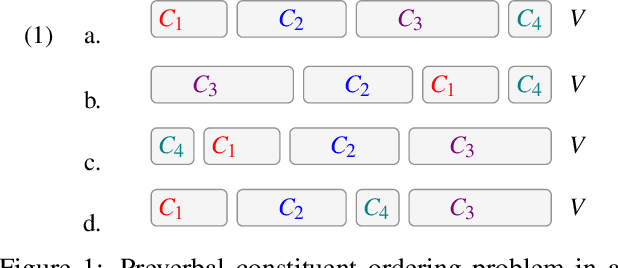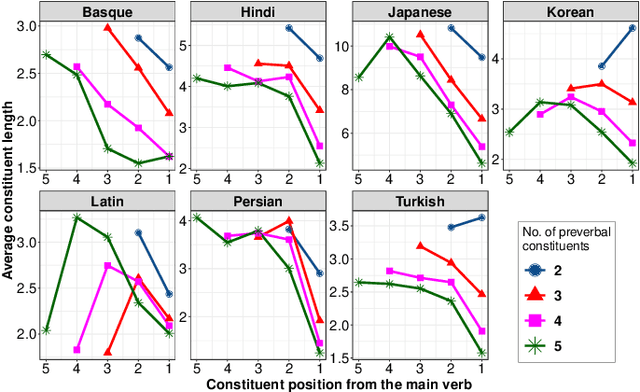Titus von der Malsburg
Work Smarter...Not Harder: Efficient Minimization of Dependency Length in SOV Languages
Apr 29, 2024



Abstract:Dependency length minimization is a universally observed quantitative property of natural languages. However, the extent of dependency length minimization, and the cognitive mechanisms through which the language processor achieves this minimization remain unclear. This research offers mechanistic insights by postulating that moving a short preverbal constituent next to the main verb explains preverbal constituent ordering decisions better than global minimization of dependency length in SOV languages. This approach constitutes a least-effort strategy because it's just one operation but simultaneously reduces the length of all preverbal dependencies linked to the main verb. We corroborate this strategy using large-scale corpus evidence across all seven SOV languages that are prominently represented in the Universal Dependency Treebank. These findings align with the concept of bounded rationality, where decision-making is influenced by 'quick-yet-economical' heuristics rather than exhaustive searches for optimal solutions. Overall, this work sheds light on the role of bounded rationality in linguistic decision-making and language evolution.
A bounded rationality account of dependency length minimization in Hindi
Apr 22, 2023Abstract:The principle of DEPENDENCY LENGTH MINIMIZATION, which seeks to keep syntactically related words close in a sentence, is thought to universally shape the structure of human languages for effective communication. However, the extent to which dependency length minimization is applied in human language systems is not yet fully understood. Preverbally, the placement of long-before-short constituents and postverbally, short-before-long constituents are known to minimize overall dependency length of a sentence. In this study, we test the hypothesis that placing only the shortest preverbal constituent next to the main-verb explains word order preferences in Hindi (a SOV language) as opposed to the global minimization of dependency length. We characterize this approach as a least-effort strategy because it is a cost-effective way to shorten all dependencies between the verb and its preverbal dependencies. As such, this approach is consistent with the bounded-rationality perspective according to which decision making is governed by "fast but frugal" heuristics rather than by a search for optimal solutions. Consistent with this idea, our results indicate that actual corpus sentences in the Hindi-Urdu Treebank corpus are better explained by the least effort strategy than by global minimization of dependency lengths. Additionally, for the task of distinguishing corpus sentences from counterfactual variants, we find that the dependency length and constituent length of the constituent closest to the main verb are much better predictors of whether a sentence appeared in the corpus than total dependency length. Overall, our findings suggest that cognitive resource constraints play a crucial role in shaping natural languages.
 Add to Chrome
Add to Chrome Add to Firefox
Add to Firefox Add to Edge
Add to Edge